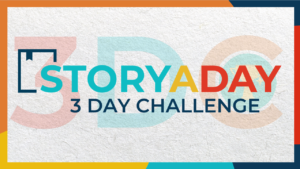 You feel, in your gut, that you should be writing. You know it’s something you want to do. But how do you know what you’re supposed to be writing?
You feel, in your gut, that you should be writing. You know it’s something you want to do. But how do you know what you’re supposed to be writing?
To non-writers, that sounds like a stupid question. Have you ever tried talking to a non-writer about this?
You & A Non-Writer, Talking
You: “I want to write but I don’t know what to write.”
Them: “Can’t you just, like, write about a wizard or some vampires or a sex-crazed billionaire and become a best-seller and split the profits with me? Can I start planning our round the world cruise for next year?”
Or, more likely.
You: I want to write but I don’t know what to write.
Them: So stop whining and do it. ‘K?
But what should you be writing?
The problem is you could be writing about ANYTHING. And that’s paralyzing. You know you need to pick something, but what?
And The Answer Is…
I don’t know.
I don’t know you.
I mean, on some level I kind of do, because you’re probably a bit like me, someone who:
- Thinks a lot,
- Worries about other people’s feelings, and
- Finds yourself standing in the middle of the kitchen with the phone ringing and no idea why you’re there but you know that damned phone has just interrupted the Best. Daydream. Ever. And that if you could just get some time to write it down you’d be happy and fulfilled and probably rich and famous to boot.
But on another level I really don’t know you.
I don’t know what you like.
I don’t know what matters to you.
I don’t know what gets you so wound up you stay up all night blogging or researching or fretting about it.
I don’t know what
- Makes you laugh, or
- What you love to read, or
- What kind of writing makes you throw books across the room (then pick them up and smooth out the cover apologetically because, hey, it might be terrible, but it’s still a book, you know?)
- Who your favorite writers are;
- What genre you couldn’t live without;
- What you like in a hero; what you love in a villain;
- Whether a galloping plot or deep introspection is more important to you;
- Whether you like a happy ending or prefer something that feels more like real life.
But oh, look.
I just gave you a list of things you might use to find a way into writing your own stories.
(If you haven’t done so already, I highly recommend trying the Short Story Framework to help you vault into that first story. Get a free copy when you sign up for StoryADay updates.)
The Big Secret…That Isn’t Really A Secret
Here’s the thing. Even with all of that information you’ve just gathered about yourself, there’s no way to be sure what you should be writing until you…yup, sit down and write.
The best and only way to find your way to your best style/topic/length/tone is to try everything.
Write A Lot, Write Quickly, Finish Everything
How StoryADay Can Help
How many stories did you write last month? How many last year? What did you learn from writing them? Do you even remember? I know I don’t. (I do remember for 2013 though. 2013 was a good year. I wrote a lot in 2013 and I learned a ton!)
Trust me when I tell you: if you write and finish even 20, even 12 stories in on month you will win so much more than bragging rights. You’ll win a free pass into the Secret Society of I’ve-Discovered-What-I-Want-To-Write.
Write Quickly To Defeat Your Inner-Anti-Cheerleader
Writing quickly and writing every day over a sustained period exhausts your inner-anti-cheerleader.
Sure, on the first day, she’s all perky and energetic. She jumps up and down telling you how worthless you are and how you can’t write and you shouldn’t try.
But your anti-cheerleader thrives on attention. When you turn your back on her and start writing, she can shake her pompoms all she likes, but she can’t really do anything more than distract you and make things difficult.
The next day, she’s looking a little less fresh. Maybe her hair’s not quite as neat. Maybe her jump-kicks are a little sloppy. She’s still trying, but you turn your back on her and ignore her once again.
By the fourth day, she’s getting frantic. Frankly, she’s a mess. Her eyeliner’s smudged and her hair’s all poufy, and the only reason her pompoms are shaking at all is because of her rage that you’re ignoring her.
You’ll think you’ve defeated her, but beware: she’s going to rest up for a few days and let you think she’s gone, but really she’s just waiting for you to get tired. Somewhere in the second week of your writing surge, she’s back: revitalized and vengeful. Don’t listen to her. Keep going. This is where you pull out the big guns:
Finish Everything
There is a power in finishing stories that you need to experience for yourself. I can tell you about it but you won’t believe me until you do it.
Finishing teaches you what each story is about.
Finishing shows you that you’re not a terrible writer, no matter how desperate you felt in the muddy middle of your story.
Finishing gives you a first draft you can revise.
Finishing each story gives you a biochemical surge that triggers your brain’s reward centers and makes it more likely you’ll finish the next.
And sitting down, every day*, to start the next story is what defeats your inner-anti-cheerleader. The routine of it tells her firmly that you are going to ignore her again today. She can’t stand up against that kind of ritual snubbing.
(*’Every day’ doesn’t mean ‘every day’. But having a routine is a powerful thing. More about that later this week…)
It’s all very well for me to tell you to sit down to write every day, but what about the rest of your life? You have responsibilities, right? People who rely on you? Deadlines and obligations unrelated to your writing. How on earth are you supposed to find time to write as well?
Other Tools
 If you’d like to be writing more, better short stories, consider taking the StoryADay 3-Day Challenge, a guided workshop that builds your storytelling skills over three focused days of work.
If you’d like to be writing more, better short stories, consider taking the StoryADay 3-Day Challenge, a guided workshop that builds your storytelling skills over three focused days of work.
Also check out the StoryADay Which Famous Writer Are You. It figures out what kinds of stories you like to tell and who your audience is, by asking you a few fun questions. It’s crazily accurate!
Check out my guides Breaking Writer’s Block, Becoming A Better Writer and the Month of Writing Prompts 2016.
Read More
Back: The StoryADay Essentials Series
Previous: Six Simple Steps To Jumpstart Your Writing
Next: How To Justify Your Writing Time (To Yourself, And To Family & Friends)
